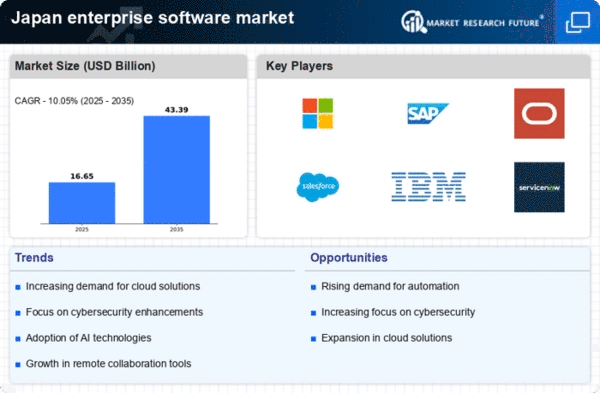The enterprise software market in Japan is characterized by a dynamic competitive landscape, driven by rapid technological advancements and increasing demand for digital transformation across various sectors. Major players such as Microsoft (US), SAP (DE), and Oracle (US) are strategically positioned to leverage their extensive portfolios and innovative capabilities. Microsoft (US) focuses on cloud-based solutions, enhancing its Azure platform to cater to the growing needs of businesses seeking scalable and secure infrastructure. SAP (DE) emphasizes its commitment to sustainability and intelligent enterprise solutions, aiming to integrate AI and machine learning into its offerings. Oracle (US) continues to expand its cloud services, particularly in database management and enterprise resource planning (ERP), which are critical for organizations undergoing digital transformation. Collectively, these strategies foster a competitive environment that prioritizes innovation and customer-centric solutions.
Key business tactics within the market include localizing software solutions to meet specific regional needs and optimizing supply chains to enhance service delivery. The competitive structure appears moderately fragmented, with a mix of established giants and emerging players vying for market share. This fragmentation allows for diverse offerings, yet the influence of key players remains substantial, as they set industry standards and drive technological advancements.
In October 2025, Salesforce (US) announced a strategic partnership with a leading Japanese telecommunications company to enhance its customer relationship management (CRM) solutions tailored for local businesses. This collaboration is significant as it not only strengthens Salesforce's foothold in the Japanese market but also enables the integration of advanced communication tools, thereby enhancing customer engagement and operational efficiency. Such partnerships are indicative of a broader trend where companies seek to localize their offerings to better serve regional markets.
In September 2025, IBM (US) launched a new AI-driven analytics platform specifically designed for the Japanese manufacturing sector. This initiative is crucial as it addresses the unique challenges faced by manufacturers in Japan, such as supply chain disruptions and the need for real-time data insights. By focusing on industry-specific solutions, IBM positions itself as a leader in providing tailored enterprise software that meets the evolving demands of its clients.
In August 2025, ServiceNow (US) expanded its operations in Japan by opening a new regional office aimed at enhancing customer support and service delivery. This move underscores ServiceNow's commitment to the Japanese market and reflects a growing trend among enterprise software companies to establish a more localized presence. By doing so, ServiceNow can better understand customer needs and respond more effectively to market demands.
As of November 2025, current trends in the enterprise software market include a strong emphasis on digitalization, sustainability, and the integration of AI technologies. Strategic alliances are increasingly shaping the competitive landscape, as companies recognize the value of collaboration in driving innovation. Looking ahead, competitive differentiation is likely to evolve, with a shift from price-based competition to a focus on technological innovation, reliability in supply chains, and the ability to deliver customized solutions. This transition may redefine how companies compete, emphasizing the importance of agility and responsiveness in a rapidly changing market.

















